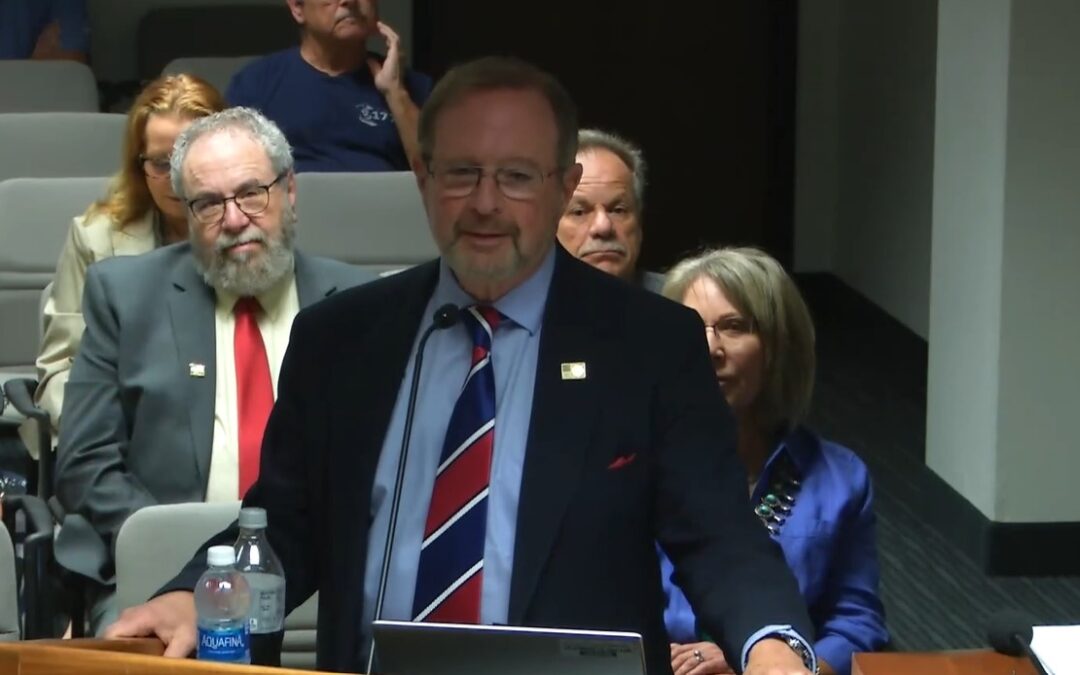
by Corinne Murdock | Sep 6, 2023 | News
By Corinne Murdock |
Last week, a superior court judge ruled that Secretary of State Adrian Fontes and his predecessor, now-Gov. Katie Hobbs, enforced an Election Procedures Manual (EPM) that ran afoul of voter signature verification law. The problematic EPM in question was crafted by Hobbs in 2019.
The ruling came in the case Arizona Free Enterprise Club v. Fontes. Contrary to the law, Fontes claimed to the court that the term “registration record” was ambiguous and up for interpretation — meaning, he could decide what constituted a valid signature record for the purposes of verifying the validity of a ballot signature. For that reason, Fontes said that the lawsuit against his administration should be dismissed.
Judge John Napper disagreed, rejecting the motion to dismiss last Friday; he stated that only a voter’s signature used to register to vote was valid. Napper ordered Fontes to adhere to the definition of “registration record” for the purposes of signature verification.
“Here, the langu[ag]e of the statute is clear and unambiguous. The statute requires the recorder to review the voter’s registration record. The common meaning of ‘registration’ in the English language is to sign up to participate in an activity,” wrote Napper. “No English speaker would linguistically confuse the act of signing up to participate in an event with the act of participating in the event [….] Applying the plain and obvious meaning of ‘registration,’ the legislature intended for the recorder to attempt to match the signature on the outside of the envelope to the signature on the documents the putative voter used to register.” (original emphasis included)
Fontes petitioned the court to interpret the law to mean that other documents could be included in the definition of “registration record” based on a change of the law from reading “registration form” to “registration record.” Fontes argued that “record” was a more expansive term meant to encompass a greater set of documents than “form.” Fontes also argued that the term was ambiguous and therefore up to interpretation.
Napper rejected these arguments. The judge explained that the term change only expanded the “volume of documents” for signature verification to allow for review of multiple forms comprising a registration record. Napper also declared that the statute wasn’t ambiguous at all.
“That limitation remains the same, documents are part of the ‘registration record’ only if they involved the voter’s ‘registration,’” stated Napper. “[T]he recorder is to compare the signature on the envelope to the voter’s prior registrations (the record).”
Napper also declared that the Arizona Free Enterprise Club (AFEC) correctly defined “registration record,” unlike Fontes and former Secretary of State Katie Hobbs (now governor) per her 2019 EPM. Napper ruled that Hobbs’ 2019 EPM violated the law.
“The 2019 EPM creates a process that contradicts the plain language of A.R.S. §16-550(A),” stated Napper. “Therefore, this portion of the EPM and the instruction from the Secretary do ‘not have the force of law.’”
Napper’s ruling acknowledges a major issue: in the four years of its use, Hobbs’ unlawful 2019 EPM signature verification instruction has carried “the weight of the law.”
Mi Familia Vota also intervened in the case and requested dismissal of AFEC’s lawsuit. They claimed that any real or existing issues with the EPM didn’t matter because Fontes would produce a new EPM this December that could potentially adhere to state law. Napper also rejected this argument. The judge pointed out that those in the executive branch, including Hobbs, have consistently failed to produce a valid EPM, including in 2021.
“While the production of a new EPM is statutorily required, the multiple offices of the executive branch have not consistently adhered to the statute’s dictates,” said Napper. “They were unable to produce an EPM in 2021. This is why the 2019 manual carries the force of law to this day. The Court has been unable to find any authority suggesting a case is not ripe for decision because a government actor may choose a different course of conduct in the future.” (emphasis added)
The case is ongoing, with a status conference scheduled later this month.
Corinne Murdock is a reporter for AZ Free News. Follow her latest on Twitter, or email tips to corinne@azfreenews.com.

by Corinne Murdock | Sep 6, 2023 | News
By Corinne Murdock |
The Arizona House Ad Hoc Committee on Oversight, Accountability and Big Tech convened on Tuesday to discuss the influence of Big Tech on free speech.
Chairing the committee was State Rep. Alex Kolodin (R-LD03); the two other members were State Reps. Neal Carter (R-LD15) and Cesar Aguilar (D-LD26). The committee heard testimony from Robert Epstein, a renowned psychologist and Big Tech data researcher, and James Kerwin, senior counsel for Mountain States Legal Foundation. More individuals were reportedly scheduled to testify, but Kolodin disclosed that they were unable to do so for fear of retribution by Google.
Kolodin opened the committee meeting with allegations of the “disturbing parallels” between modern society and the fictional world depicted in the book “1984” by George Orwell. Kolodin referenced the Orwellian concepts of “thoughtcrime” and “newspeak,” claiming further that they exist currently.
“That crime was thoughtcrime, and the crime was not merely that you said something wrong, the crime was that you thought wrong, that you weren’t purely of a mind that matched the party’s ideology,” said Kolodin. “There is a fear that is exactly what’s going on in our country today. There’s an attempt to redefine free speech as misinformation.”
Epstein was the first guest speaker. He summarized his ongoing, near-decade data collection of Google’s practice of creating “ephemeral experiences,” or persuasive search engine results, to influence voters. The term was discovered to be regularly used by Google internally via their company emails.
Epstein dubbed Google’s practice the “Search Engine Manipulation Effect” (SEME).
Based on multiple experiments on SEME conducted domestically and abroad, Epstein determined that the practice consistently influenced voters to shift their voting preferences anywhere from 20 to 80 percent.
“The most disturbing set of scientific findings that I’ve ever encountered in my life. The more we have learned, the more disturbed I have become at what I’m finding,” said Epstein.
AZ Free News reported last November that there was an apparent, consistent bias for two Democratic candidates — then-gubernatorial candidate Katie Hobbs and then-secretary of state candidate Adrian Fontes — over their respective Republican opponents, Kari Lake and Mark Finchem.
We reported that search results for “Katie Hobbs” brought up her campaign website first, followed by news reports that portrayed her favorably, her Twitter feed, her Wikipedia page, an endorsement by Emily’s List, her Ballotpedia, and her Facebook.
By contrast, a search for “Kari Lake” didn’t yield her campaign website on any of the first 11 search result pages, and didn’t appear even when omitted results were included. Her search results yielded a Wikipedia page first alongside unfavorable media coverage.
It wasn’t until after our report was published that search results for Kari Lake were modified. Epstein declared during Tuesday’s meeting that Google’s interference resulted in a race-determining advantage for Hobbs.
“If you took Google out of that picture, Kari Lake would’ve won,” said Epstein.
According to Epstein’s data collection, Google would also discriminately deploy voting reminder graphics to certain voters at certain times, with reported favoritism to Democratic voters. Some voters reportedly didn’t get a reminder to vote.
Epstein disclosed that he voted for both Hillary Clinton in 2016 and Joe Biden in 2020, but that he was concerned with Google’s influence over private decision-making.
“I object to the fact that a private company that is not accountable to the public in any way is messing with our elections,” said Epstein.
Epstein proposed implementing a monitoring system that would prevent manipulation from Google in the future.
After an hour break, Kerwin testified on the relationship between government and Big Tech concerning censorship. He explained that government wording in its communications determines whether a constitutional violation occurred. In most cases, Kerwin declared that the open relationship between government and social media companies to monitor speech exists in a “gray area” within the law.
Kerwin cited the ongoing case, Missouri v. Biden, as a “watershed” case on this gray area. The Biden administration was sued for coordinating with social media companies to flag and remove posts, and the federal judge in the case determined that the plaintiffs were likely to prevail based on preliminary evidence produced.
That’s when Kerwin broached the subject of Gov. Katie Hobbs. Kerwin reviewed several emails from Hobbs’ secretary of state staff requesting that Twitter remove certain tweets they classified as misinformation or disinformation.
“This suggests a troubling intention on part of a government official to stamp out speech they disagree with,” said Kerwin.
Corinne Murdock is a reporter for AZ Free News. Follow her latest on Twitter, or email tips to corinne@azfreenews.com.

by Corinne Murdock | Sep 5, 2023 | News
By Corinne Murdock |
Another $10 million in American Rescue Plan Act (ARPA) funding has been issued, this time from Maricopa County to Phoenix for the purpose of building more affordable housing.
$5 million of the ARPA funds will go to repurposing 125 rooms in a former Super 8 Motel off the I-17 and Northern Avenue, with the other $5 million going toward redevelopment efforts in the Edison-Eastlake Community (EEC) east of downtown Phoenix.
That’s around $40,000 per room for the motel renovation, and nearly $46,000 per unit. The latter development, EEC, will include unit sizes ranging from one to five bedrooms. Phoenix Mayor Kate Gallego told KJZZ that people were excited at the prospect of larger affordable housing units during meetings about the redevelopment.
City-funded emergency shelters served over 2,600 families and over 5,900 individuals in 2021, over 3,400 families and over 7,300 individuals in 2022, and over 1,100 families and over 2,200 individuals so far this year. This year, 249 individuals left for permanent housing.
Since 2021, city-funded rapid rehousing programs have moved 579 households into rental housing: 398 in 2021, 139 in 2022, and 42 so far this year. Rapid rehousing programs place homeless individuals into conditionless permanent housing. Only one individual has acquired permanent housing this year.
Of nearly $400 million in total ARPA funding, the city has reported spending over $37.2 million of $119.3 million for affordable housing and homelessness. However, the city hasn’t reported spending any of its $16 million ARPA funding allocated specifically for the affordable housing program. It also hasn’t reported spending any of the $5 million allocated for its community land trust program. According to the city, these programs are “pending federal guidance.”
The Arizona legislature has also allocated an historic $150 million to the Housing Trust Fund. The Arizona Department of Housing also allocated $13.3 million to the city, with some of the funds applied to illegal immigrants as well as Arizona citizens.
The city has allocated at least $245 million in the past five years on the EEC.
The city received a $30 million Choice Neighborhoods Grant from the Department of Housing and Urban Development (HUD) in 2018 for its EEC One Vision Plan. The city used that grant along with $190 million in leverage to redevelop the EEC with mixed-income housing. The HUD grant went toward demolishing 577 units and building over 1,100 units.
In December 2021, the Department of Justice (DOJ) awarded the city $1 million for its criminal justice innovation program concerning EEC. The DOJ reported “alarmingly high” rates of domestic violence and sexual offenses, as well as chronic issues with drug sales and usage. Phoenix Police Depratment (PPD) had two to three higher call rates for overdoses, suicide attempts, and dead bodies than any other Phoenix neighborhood. The DOJ issued over $18.7 million in those types of grants that year.
Corinne Murdock is a reporter for AZ Free News. Follow her latest on Twitter, or email tips to corinne@azfreenews.com.

by Corinne Murdock | Sep 3, 2023 | News
By Corinne Murdock |
A survey conducted in part by Arizona State University (ASU) researchers revealed that a majority of Arizonans, Californians, and Texans oppose “trans rights.”
The survey is the latest from a joint polling project among researchers from ASU, Stanford University, and the University of Houston.
According to the survey, a majority of Arizonans opposed the idea of gender identity dictating bathroom usage by 54 percent, women’s sports participation by 63 percent, and minors receiving gender transition surgery and drugs by 51 percent.
The researchers remarked that this pattern of majority opposition to gender ideology dictating bathroom usage, sports participation, and medical procedures existed from the blue state of California, the purple state of Arizona, to the red state of Texas.
Independents in Arizona — now the largest voting population — opposed gender ideology dictating bathroom usage by 48 percent, women’s sports participation by 65 percent, and minors receiving gender transition surgery and drugs by 46 percent.
Most Democrats in Arizona, as well as Texas and California, believed gender ideology should dictate bathroom usage, but were more evenly divided when it came to participation in women’s sports. Most Democrats opposed bans on gender transition procedures for minors, though there were a higher percentage of those unsure on the issue than their Republican counterparts.
The study also reflected that women were more likely than men to support gender ideology determining bathroom usage, women’s sports participation, and minors receiving gender transition procedures across all three states.
Additionally, those with higher levels of education were more likely to support gender ideology determining bathroom usage across all three states: those with high school degrees were less supportive than those with some college education, and those with some college education were less supportive than those with four years of college education or a postgraduate degree. However, for women’s sports and minors receiving gender transition procedures, no significant differences were noted.
The researchers also reported that the presence or absence of religious beliefs served as a strong indicator whether an individual supported or opposed gender ideology.
“Across the red, purple and blue states of Texas, Arizona and California, residents who regularly attend religious services are significantly more likely than those residents who never attend religious services to support policies that restrict the ability of transgender people to choose which bathroom to use, participate in women’s sporting events, and (for children) receive gender-affirming medical treatment,” stated the survey report.
Over 1,000 Arizonans participated in the survey: the second in a series of five surveys, the first of which was on abortion. There, a majority across all three states expressed support for abortion with little or no restrictions (62 percent of Arizonans, 69 percent of Californians, and 54 percent of Texans).
Corinne Murdock is a reporter for AZ Free News. Follow her latest on Twitter, or email tips to corinne@azfreenews.com.

by Corinne Murdock | Sep 2, 2023 | Education, News
By Corinne Murdock |
Northern Arizona University (NAU) is crediting their largest first-year undergraduate class ever to its equitable tuition program favoring Native American students. NAU reported a 47 percent increase in new Native American undergraduate students, its largest ever.
As AZ Free News reported in February, the tuition program provides free tuition regardless of family income to Native Americans from Arizona’s 22 federally-recognized tribes but requires students of all other races to fall below a certain financial threshold to qualify.
In a press release issued on Monday, NAU President José Luis Cruz Rivera said the admissions boost afforded by the tuition program reflected the university’s ability to spur economic and social mobility.
“The accomplishments and backgrounds of our fall 2023 entering class demonstrates the life-changing opportunity for upward economic and social mobility that NAU’s exceptional academic programs offer, and I am pleased to see so many Arizonans from all walks of life entrust their educational futures to this great university,” said Cruz Rivera.
The program falls under the university’s financial aid program, Access2Excellence (A2E), which launched last April and initially was designed to only provide free tuition for Arizona residents with a household income below $65,000. It wasn’t until last November that the special exception for Native Americans from Arizona tribes came, at the behest of NAU’s Native American Advisory Board.
Cruz Rivera announced the special exception to the program during Native American Heritage Month.
At the time, the university explained the program’s special attention to Native American students was part of a “strategic priority” for serving Indigenous people nationwide. The vice president of the Office for Native American Initiatives, Ann Marie Chischilly, confirmed this equity focus for the free tuition program.
“We are dedicated to being the nation’s leading institution serving the indigenous peoples and providing a clear and affordable pathway to an exceptional education,” said Chischilly.
This fall’s undergraduate class also represented NAU’s largest number of Arizona resident students and Hispanic or Latino students.
The Arizona Board of Regents (ABOR) praised the success of NAU’s free tuition program.
ABOR also highlighted the program in their latest annual report, released last week, as well as NAU’s $5 million pledge to prioritize indigenous people in curriculum and recruitment. The university’s pledge matches the $5 million from the Mellon Foundation.
According to NAU’s fall 2022 enrollment data, there were approximately 1,500 students identifying as American Indian or Alaskan Native.
Corinne Murdock is a reporter for AZ Free News. Follow her latest on Twitter, or email tips to corinne@azfreenews.com.





